In this article, we will explain what hyperhidrosis is and describe the most common causes that cause it. We will also touch on the main manifestations excessive sweating and methods of treatment of this problem, including at home.
Content:
Hyperhidrosis is increased sweating, which is not associated with physiological, that is, normal, provocateurs of increased work of the sweat glands (physical or emotional stress, overheating, high temperature environment). Wherein excessive sweating may be an individual feature and be inherited, and may have a pathological basis.
Types of hyperhidrosis
Hyperhidrosis is classified according to several factors. Due to the occurrence, primary (juvenile) hyperhidrosis is isolated, which is very rare during the peak of puberty, and secondary, which is diagnosed more often and has a somatic, neurological or endocrine cause. According to the “scale” of the manifestation of the disease, there is local hyperhidrosis, that is, local, when some specific area of the body sweats heavily (armpits, face, feet, groin area, palms), and generalized, when excessive sweating is observed throughout the body and most often is the result of a serious illness.
armpit hyperhidrosis
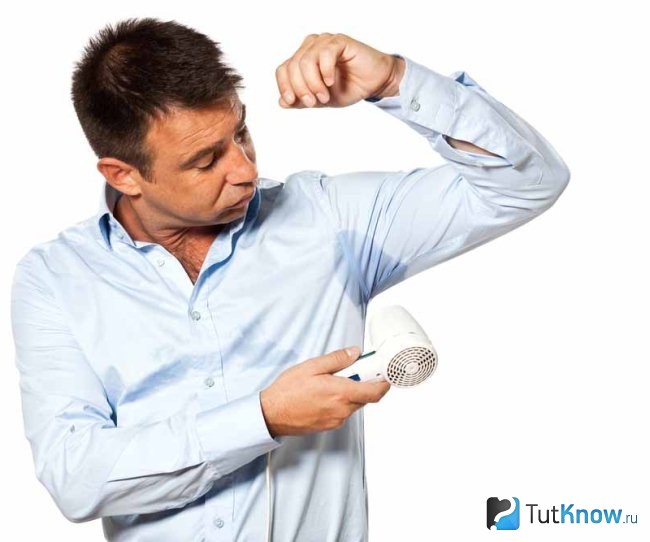
Excessive activity of the sweat glands in the armpit is the most common form of hyperhidrosis. Constant wet spots on clothes, combined with an unpleasant odor, become the subject of irritation not only for others, but also for the person who suffers from this disease.
Hyperhidrosis of the palms
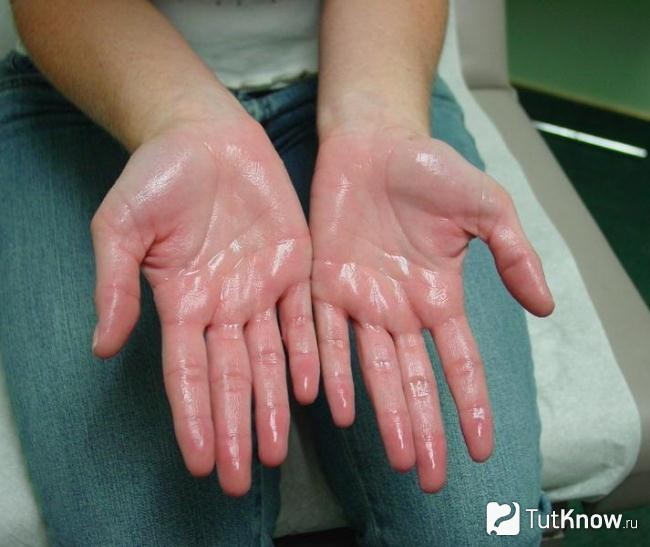
An equally common localization of heavy sweating is the back surfaces of the palm. Despite the fact that in this case it is not necessary to worry about stains on clothes, such a disease brings no less discomfort to the life of its owner. For example, it is difficult for such people to communicate, especially tactile (when touching, shaking hands), when moving objects or working with documents, when the former can simply fall out of their hands, and the latter leave prints.
Excessive sweating in the armpits
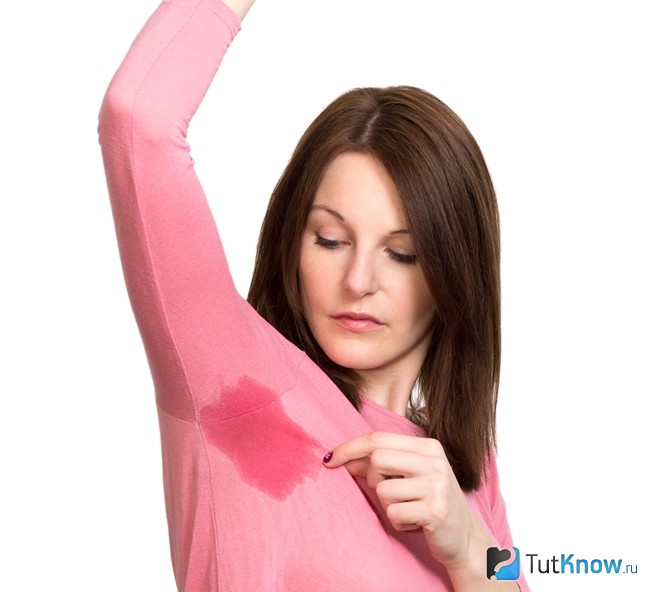
The most unpleasant moments that accompany sweating in the armpit area are not only stains on clothes, specific “aromas” and increased nervousness. The product of increased sweating, that is, sweat is an excellent environment for fungi and bacteria with all the conditions for their existence and reproduction. Hence the intensity of the smell, and the risk of irritation or, worse, skin diseases.
Hyperhidrosis of the head and face
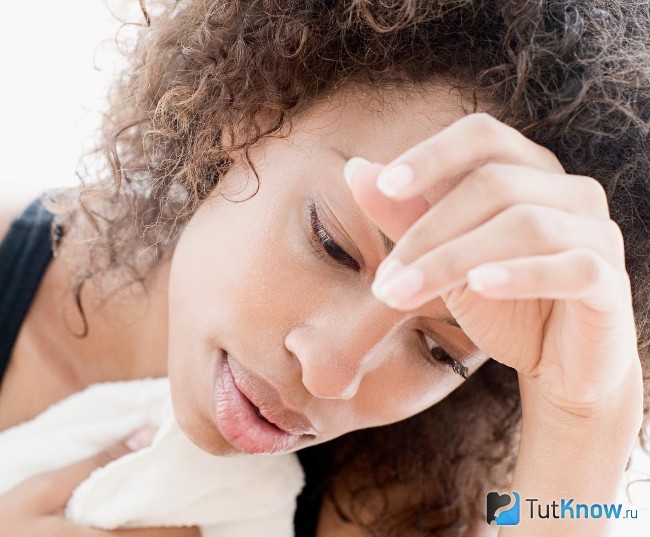
A feature of this local form of increased sweating is that both the entire head and neck and its individual areas can be involved in the pathological process ( upper lip forehead, nose, cheeks). At the same time, it is often provoked by stressful situations, including phobias (for example, fear of public speaking). Quite often, this type of hyperhidrosis is combined with hyperhidrosis of the palms and erythrophobia (when, due to stress, the face is said to be “filled with color”).
Hyperhidrosis inguinal-perineal

Such a disease is not common, but it can significantly complicate the existence of a person, including in the intimate sphere. Structural features of the perineal organs, supplemented by linen and clothes that are constantly wet due to sweating, can lead to irritation and diaper rash, as well as the occurrence of painful, itchy sores and skin diseases.
Local hyperhidrosis

Another representative of local, that is, local hyperhidrosis, is increased sweating of the feet. This is a fairly common disease, manifested by profuse sweating in the area of \u200b\u200bthe soles and an unpleasant odor from the feet, and eventually from shoes.
Reasons for excessive sweating
Nature has provided for our body a mechanism that will protect it from overheating or remove excess fluid. This mechanism is called sweating. It works during sports and physical labor, high temperature outdoors or indoors, as well as in stressful situations. However, there are other activators of the sweating mechanism when the cause is a disease.
The main symptoms of hyperhidrosis
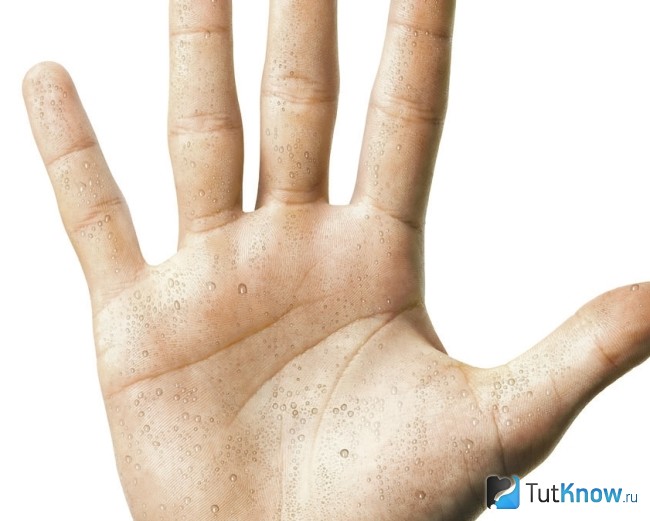
Manifestations of excessive sweating in any area of the body have similar symptoms, namely:
- Excessive sweating, accompanied by a feeling of moisture and discomfort in the place of its manifestation.
- An unpleasant odor that can indicate both untidiness and the addition of a bacterial or fungal infection.
- Changes in the skin in the area of increased sweating: on the hands - cyanosis, coldness to the touch, in the armpits and in the groin - irritation, rashes, diaper rash.
The main causes of hyperhidrosis

It would seem that it is not at all difficult to find the cause of hyperhidrosis. In fact, the true mechanism for the occurrence of such a state is still not known. It is only clear for certain that the function of regulation, or rather the activation of sweating, is assigned by nature to the sympathetic departments. nervous system. When exactly the failure occurs, scientists have not yet figured out, but the alleged factors that can cause it have been named.
These included: non-compliance with personal hygiene, wearing synthetic clothing and underwear, infectious diseases, hormonal disorders, obesity, traumatic brain injuries and focal brain lesions, tumor processes, Parkinson's disease, neurasthenia, diseases of the cardiovascular system or kidneys. There is also the so-called essential hyperhidrosis, the cause of which cannot be determined.
Infectious diseases as a cause of hyperdrosis
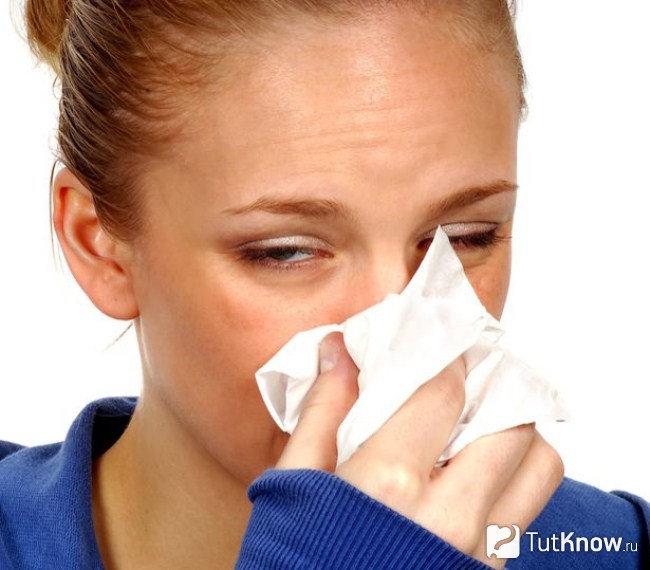
Abundant sweat during the flu or acute respiratory infections is not the only manifestation of hyperhidrosis in infectious diseases. This condition can be a manifestation of much more serious pathologies and even sometimes helps the specialist to make the correct diagnosis. So, increased sweating at night may indicate the presence of infectious agents in the lungs or bronchi (tuberculosis, purulent bronchitis, pleurisy), as well as the presence of HIV infection or AIDS. With excessive sweating, our body reacts to malaria, late stages of syphilis, brucellosis.
Diseases of the endocrine system as a cause of sweating
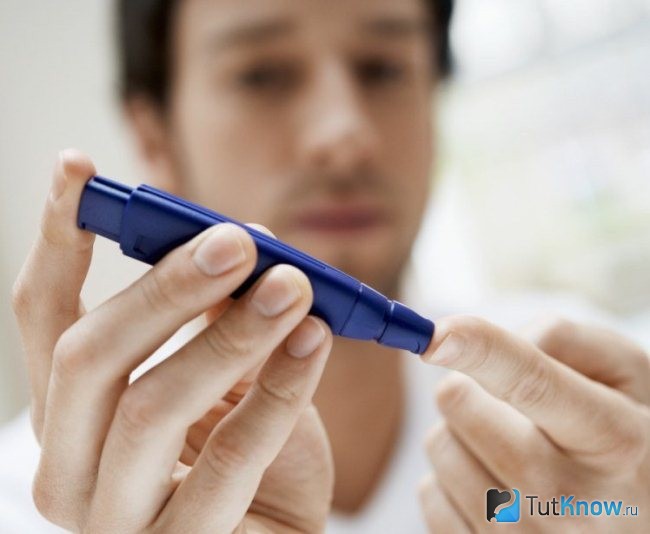
Increased sweating can be caused by disturbances in the functioning of the endocrine glands, that is, hormonal disruptions. For example, sweating often occurs in people with hyperthyroidism, that is, an overactive thyroid gland. The same unpleasant problem occurs in most women who are in menopause, as well as in patients with diabetes.
Oncological diseases as a cause of profuse sweating

Despite the fact that the diagnosis of cancer is still difficult due to the variety of symptoms, most specialists will definitely pay attention to such a symptom as hyperhidrosis. Often this condition accompanies tumor processes with localization in the adrenal glands, ovaries, pituitary gland, intestines (carcinoma) and lymphoid system (Hodgkin's disease). It is noteworthy that most often excessive sweating indicates a fairly serious development of the process.
Excessive sweating and pregnancy

An interesting position is also a powerful hormonal shift in the body. future mother, therefore, not only taste preferences and mental state can be disturbed, but also the work of the sweat glands. Usually, such a nuance of pregnancy goes away with it, that is, after childbirth, but it can also linger for the period of breastfeeding.
Treatment of hyperhidrosis
The main rule for the successful treatment of excessive sweating, like any other disease, is to identify and eliminate the cause. And above all, it is necessary to exclude the most significant pathologies (oncology, infectious diseases and endocrine disorders). Naturally, it is impossible to do this on your own, so you should definitely consult a doctor who will prescribe (if necessary) additional examinations from specialized specialists.
Home treatment for hyperhidrosis
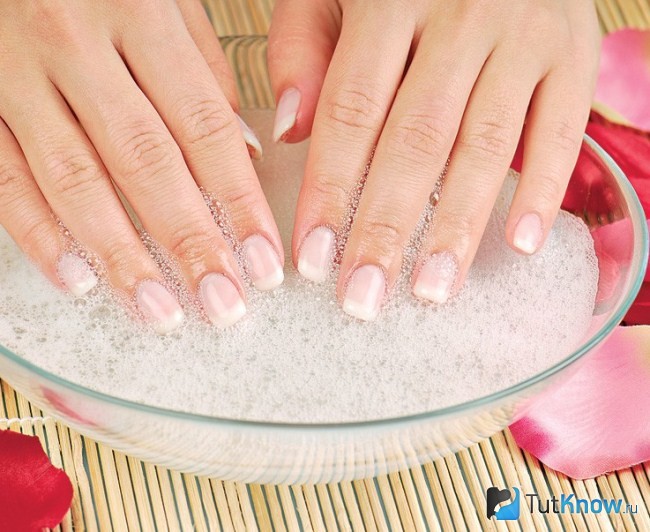
We note right away that the fight against increased sweating at home will be effective only if you know exactly the cause of the disease, and the disease itself has a mild stage.
- Sweating of the palms can be removed with the help of saline baths (1 l hot water+ 3 tbsp. any salt), which must be carried out twice a day, without removing your hands from the water until it cools.
- Foot sweating can be reduced by using oak bark powder or powdered potato starch.
- Sweating of the face and head can be reduced by rubbing them several times a day with cucumber juice in the form of ice cubes.
- General sweating will help defeat the infusion of sage (2 tbsp. Crushed plants per 0.5 liters of boiling water), which should be taken three times a day no earlier than an hour after eating.
How to treat excessive sweating
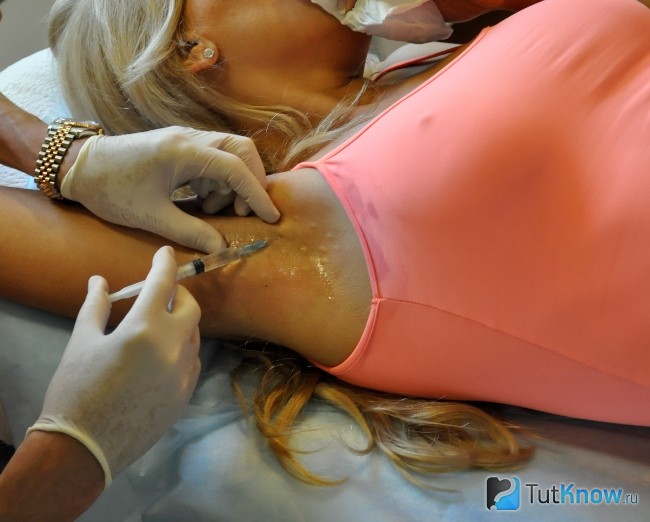
We will not deviate from the topic and recall that the diagnosis and treatment of hyperhidrosis is established by a specialist, that is, a doctor. In the case when the reason for the increased work of the sweat glands is a serious disease (infection, oncological process or hormonal disorders), the treatment will be directed specifically at it.
If all of the above factors are excluded, the main treatment regimen for excessive sweating consists of the following conservative methods: psychotherapy, drugs, antiperspirants, physiotherapy (iontophoresis).
At the same time, personal hygiene is a prerequisite for successful treatment of hyperhidrosis: frequent washing of problem areas of the body, regular replacement of underwear and bedding, bathing with soda, string, chamomile, calendula. It is recommended to limit yourself in taking liquids and spicy foods, especially hot ones. If the cause of excessive sweating is excess weight then you should get rid of it.
Modern methods of dealing with hyperhidrosis include the introduction of botulinum toxin-containing drugs - Botox, Dysport - into the problem area. They block the work of the sweat glands, but only for a while (from six months to 8 months).
Sweating Laser Treatment
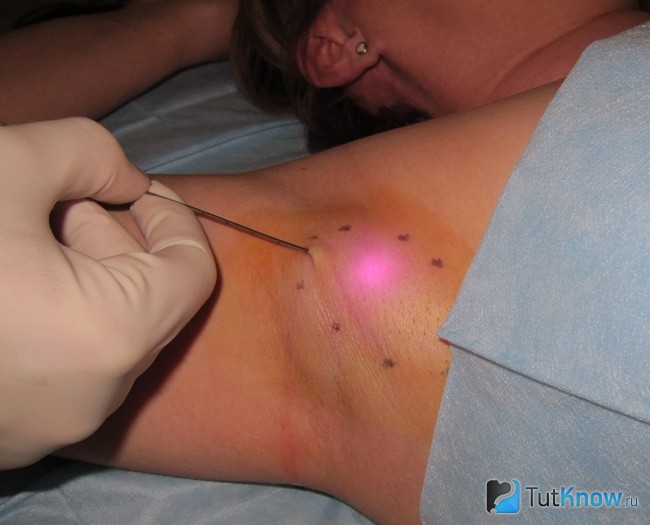
Another modern way to cope with the problem of increased sweating is laser therapy. It gives a longer result compared to Botox, since the laser beam does not block the work of the sweat glands, but destroys them. The procedure is performed on an outpatient basis under local anesthesia. As in the case of the introduction of drugs with botulinum toxin, the entire laser treatment procedure takes up to half an hour and does not require a subsequent stay in the hospital.
Surgery for hyperhidrosis

Despite the fact that conservative methods, if properly prescribed, can be quite effective, only surgery can radically solve the problem of excessive sweating. But it is used not so often and only in case of ineffectiveness of conservative treatment.
The surgical techniques used for the treatment of hyperhidrosis can be divided into 2 types:
- Local, that is, surgical intervention in the problem area (liposuction, curettage - removal of sweat glands, excision of a skin area along with glands).
- Central(sympathectomy, that is, partial or complete disruption of the sympathetic trunk, which regulates the process of sweating). Such a cardinal method as sympathectomy is used only in severe cases of hyperhidrosis.
Medications for hyperhidrosis

As a drug therapy, if the cause of hyperhidrosis is not a disease, such groups of drugs are prescribed as:
- Sedatives (sedatives) and tranquilizers to relieve nervousness and thereby prevent increased sweating.
- Atropine drugs, which affect the sympathetic nervous system, reducing its activity.
- Fortifying means, they include vitamins, iron preparations, fluorine, calcium.
As you can see, hyperhidrosis is not only discomfort and bad breath. Excessive sweating can be a sign of a serious medical condition. Therefore, it is not worth ignoring it and trying to be treated on your own. Consult a doctor and clearly follow all his recommendations - then it will be much easier and safer to deal with the problem.
When the sweat glands are overactive, excessive body sweating occurs. Excessive sweating (hyperhidrosis) can occur for a variety of reasons (overactive nerves, emotional factors, serious medical conditions). Ordinary sweating occurs, as a rule, when exposed to high temperature, or during vigorous exercise. Sweating disorders can be caused by psychological problems.
Sweating when the body is exposed to high ambient temperatures is a normal reaction of the body. Hyperhidrosis is usually said to be when the body produces more sweat than necessary.
Sweating may have an emotional basis, ie. it's a kind of stress response. AT this case increased sweating occurs on the palms, in the armpits and other parts of the body. The presence of a specific smell of sweat depends on the specific degrading bacteria.
In addition, various diseases (for example, diabetes, thyrotoxicosis, kidney disease) can cause excessive sweating. Excessive sweating can occur with endocrine disorders, with a diet that includes spicy and salty foods. Hyperhidrosis very often occurs with alcohol poisoning.
Methods for eliminating excessive sweating
Personal hygiene is the most important process in the presence of heavy sweating. Personal hygiene (shower) allows you to eliminate the smell of sweat, cleanse the skin, give freshness. It is important to remember that hair removal in the armpits also plays an important role in eliminating the smell of sweat, because the hair contributes to the appearance of an unpleasant odor (). In addition, you should use appropriate cosmetics to combat sweat in the armpit (antiperspirants), or use folk methods ().
With increased sweating, you should wear clothes only from natural fabrics, because. artificial fabrics prevent the passage of air, which increases the secretion of sweat. The most suitable material for people with increased sweating is cotton. Airy cotton allows the skin to breathe, provides comfort, creates conditions to eliminate excessive sweating. However, if the problem occurs constantly, then in this case you should consult a doctor, because. Excessive sweating can be a symptom of a serious medical condition. Sometimes, surgical methods of treatment (removal of sweat glands) are used to eliminate excessive sweating.
Natural perspiration
To protect the body from overheating, the body secretes sweat. Sweating is natural process and the reaction of the body to cool the body. In addition, sweating can be helpful during body cleansing, as toxins are removed from the body along with sweat.
The center responsible for measuring body temperature is located in the hypothalamus. There are special nerve cells that cause the activation of sympathetic nerves when heated (exposure to temperature). Subsequently, the sweat glands are affected and sweating occurs.
In addition, the activation of sweat glands occurs during physical activity, psychological factors (excitement, fear), infectious diseases (fever), and hormonal influences.
What is hyperhidrosis?
Hyperhidrosis is excessive body sweating that is not normal (different parts of the body). Excessive sweating that occurs only in a small, limited area of the skin (such as the palms, feet, or armpits) is indicative of focal hyperhidrosis.
Hyperhidrosis is not only aesthetic problem, but also a nuisance that can interfere with a career. For example, a musician, due to excessive sweating of the hands, changes activities.
In addition, excessive sweating (wet hands) gives many people an impression of insecurity and anxiety. Hyperhidrosis can interfere with your career, because. with social contact, excessive sweating can create a problem.
Hyperhidrosis can cause large areas of the body to sweat. Those suffering from this disease often change clothes (several times a day), because. shirts, blouses become wet with sweat.
There are primary (idiopathic) and secondary hyperhidrosis. In primary hyperhidrosis, the palms, feet, and armpits sweat. Usually none specific reasons for such increased sweating is not.
Secondary hyperhidrosis tends to occur in a number of internal and neurological conditions in which it can be an important symptom.
Causes of secondary hyperhidrosis
- Internal diseases (, infections, malignant neoplasms, thyroid diseases, diabetes mellitus, other endocrine causes);
- neurological diseases;
- Medications (psychotropic drugs, some beta-blockers);
- Warmly. Food (coffee, spices, chocolate).
Hyperhidrosis should be treated with the help of a specialist. In secondary hyperhidrosis, treatment of the underlying disease must first be prescribed. In addition, treatment depends on the severity of the disease. Sweat-stopping agents, antiperspirants, roll-on deodorants, gels, powders, or lotions often help control excessive sweating. What means to apply from sweat should be discussed with the doctor.
Hyperhidrosis is excessive sweating. Heavy sweating may affect the whole body or some areas and cause acute discomfort. This delicate problem is often sought to hide and embarrassed to go to the doctor. Meanwhile, excessive sweating of the body can be a sign of a number of serious diseases.
Men, women, children
Human skin contains millions of sweat glands. And this is a necessary condition for normal life. With sweat, harmful substances and toxins are removed, with the help of sweat, the body cools and heals. Heavy sweating in men, women and children can have various causes.
Increased sweating in men
In part, this is a genetically determined condition. Men are more physically active, more likely to overheat and need more cooling. In addition, differences in body weight matter. Larger, heavier men sweat more.
Excessive sweating in women
On average, women sweat 2 times less than men. However, hyperhidrosis occurs in them with the same frequency as in men. Excessive sweating in both sexes can be caused by the same reasons. Treatment approaches for this condition are also similar.

The only distinct cause of female hyperhidrosis lies in changes in the levels of female hormones. You can talk about hormone-dependent sweating in the following cases:
- If severe sweating occurs in short periods during each month, then we can safely talk about the hormonal cause of hyperhidrosis.
- If severe sweating occurs during pregnancy and lactation, then this is also the result of fluctuations in the level of female sex hormones.
- If excessive sweating occurs during menopause.
What to do in such cases? Consult a gynecologist. After determining the level of hormones, the doctor may decide on the appointment of hormone replacement therapy.
What to do if excessive sweating worries the child
If excessive sweating is diagnosed in children older than 6 years, then this condition can be caused by the same reasons as in an adult.
Newborn babies do not sweat at all, but starting from the age of two months, children can sweat a lot in the following cases:
- when feeding, especially if the mother is breastfeeding the baby;
- if the child is too warmly dressed;
- if he screamed and cried for a long time.
Children under 3 often sweat a lot while sleeping. Many pediatricians consider it completely natural. Do not try to get rid of this condition. Most likely, over time, the child will “outgrow” such sweating.
Many mistakenly associate heavy sweating with rickets - do not jump to conclusions! Moreover, rickets has many other, more obvious manifestations.

Idiopathic hyperhidrosis
Severe sweating of the whole body is a symptom of a number of diseases. You can get rid of the disease by accurately establishing the cause of hyperhidrosis. However, in some cases, a perfectly healthy person cannot get rid of excessive sweating. Then they talk about the idiopathic form of hyperhidrosis.
What can cause excessive sweating? Neurosis, allergies and increased reaction to external stimuli.
nervous sweating
Irritable, quick-tempered people suffering from frequent depression often suffer from hyperhidrosis. In this case, the work of the sweat glands is affected by an increased level of adrenaline.
What to do if you suspect that you have just such a form of the disease? Contacting a neurologist is the only sure way to solve the problem. Since nervous sweat makes itself felt mainly during outbreaks of aggression, the cure for neurosis will relieve unpleasant symptoms.
food allergy
Some people sweat when they eat. This causes psychological discomfort not only in a sweating person, but also in others. The reason for this hyperhidrosis is an individual reaction to a certain type of food. What to do to get rid of such hyperhidrosis? Just do not consume foods that cause such a reaction in public places.

External environmental factors
Sports, uncomfortable synthetic clothing and shoes, heat and cold - a number of reasons can cause heavy sweating. But if a person sweats so much that they have to carry a change of clothes with them and dab their palms before greeting, then this becomes a problem that requires treatment. What to do? Contact a therapist.
The reasons for such severe sweating are in the individual reaction of the sympathetic nervous system to external stimuli. Unfortunately, we cannot control this process, just as we cannot speed up our pulse or slow down our heartbeat.
Hyperhidrosis is a symptom of body dysfunction
What health problems can be accompanied by excessive sweating? Consider the most common causes occurrence of hyperhidrosis.
Fever
Common cause of profuse perspiration. Any SARS accompanied by a high temperature can cause profuse sweating. This is a normal reaction of the body to overheating. Usually, if the patient sweats at a fever, this is a good sign that the fever is subsiding.
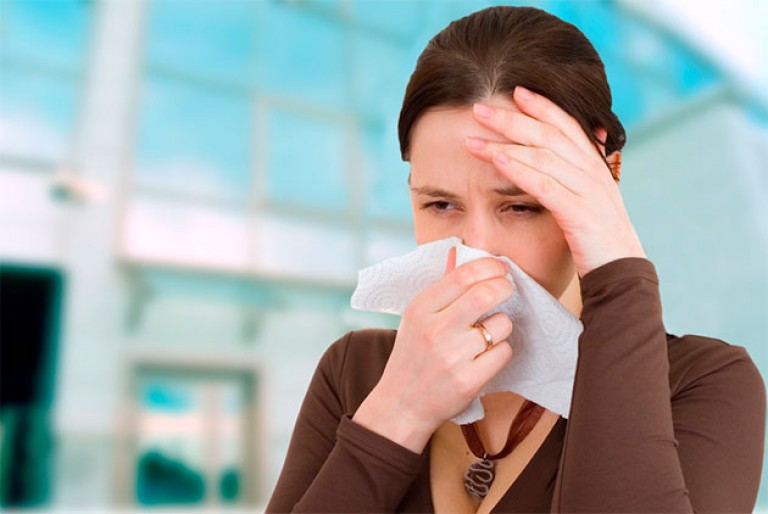
Disorders in the work of the endocrine system
The endocrine system controls the entire body. Including responsible for thermoregulation. Accordingly, many diseases of the endocrine organs can be accompanied by severe sweating.
- Thyroid dysfunction. Violates normal heat transfer in tissues. The result is increased sweating.
- Diabetes mellitus causes metabolic disorders. A decrease in blood sugar levels is often accompanied by increased sweating.
Changes in hormone levels
Characteristic for the beautiful half of humanity. The formation of menstrual function, the birth and feeding of children, menopause - all these processes affect the level of sweating.
Obesity
Increased weight is a burden for the whole body. An obese person spends more energy for life and therefore sweats more.

Diseases of the central nervous system
Mental disorders are common causes of hyperhidrosis. Common to the neurological origins of hyperhidrosis is uneven sweating. So, only one armpit or palm can sweat.
Genetic diseases
Excessive sweating is one of the symptoms of a rare genetic disease, Riley-Day syndrome. Hyperhidrosis in this disease is most pronounced in stressful situations, when the patient has an increased level of adrenaline.
Drug addiction and alcoholism
Drug and alcohol addiction is a complex disease that disrupts the biochemical processes of all systems. Against the background of drug withdrawal, in addition to other withdrawal symptoms, a state of hyperhidrosis occurs.
Tuberculosis
General malaise, weakness, weight loss, fluctuations in body temperature in tuberculosis can complement night sweats with a characteristic odor.
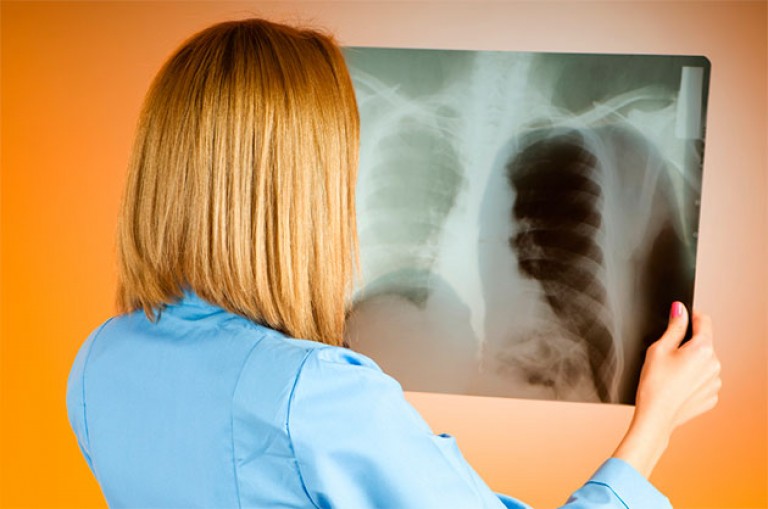
Neoplasms
Tumors of the lymphoid tissue cause profuse night sweats. Neoplasms of the adrenal glands and intestines - possible reasons hyperhidrosis.
Heart disease
The pre-infarction state of the patient is often accompanied by profuse cold sweat. Along with pain in the heart, pallor and shortness of breath, such sweating is an important symptom of the onset of myocardial infarction.
The smell of sweat as a diagnostic tool
Excessive sweating of the whole body can be a sign of many diseases. For a qualitative diagnosis of the causes, the therapist may advise you to take tests (KLA, OAM, biochemistry, a blood test for sugar and hormone levels). In addition, it would be useful to visit narrow specialists, namely:
- cardiologist;
- neurologist;
- endocrinologist.
Getting rid of the disease is possible only after a thorough history taking!
Smell of sweat
Initially, sweat is a sterile liquid. It is colorless and odorless. Sweat acquires a specific aroma when interacting with the microorganisms of our skin. However, in some cases, sweat has a pungent, unnatural odor. Often this is a key moment in finding out the causes of hyperhidrosis. What disease can a strong smell of sweat indicate?
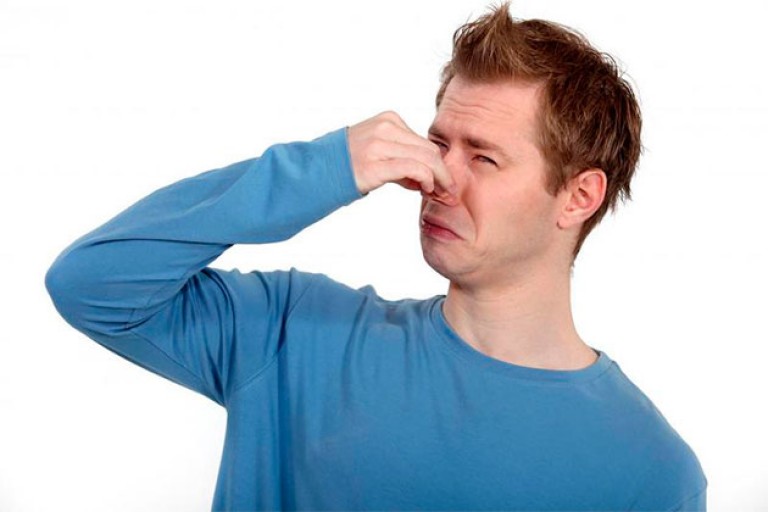
What can be done at home
Even a small increase in sweating brings significant discomfort and a desire to get rid of this condition. What can be done at home?
- Maximum attention should be given hygiene procedures. Daily showers, wet rubdowns, and frequent changes of underwear can alleviate the problem.
- Dietary nutrition is the second step that must be taken by those who want to get rid of the disease. Salty, sour, fried, exotic dishes should be excluded from the diet.
- Wear only natural fabrics! Synthetic linen and bedding should be replaced with linen and cotton.
There are so many causes of hyperhidrosis that even experts sometimes have doubts. However, high-quality diagnostics is the only chance to get rid of this unpleasant condition. Only a doctor can prescribe the right treatment. Surgical or medical intervention can greatly alleviate the patient's condition and help him live a full life without complexes.
Everyone sweats because sweating is a normal function of the body. However, it can cause discomfort and psychological troubles, and intense and uncontrolled sweating can seriously complicate life. Therefore, this condition is called hyperhidrosis. should not become a burden. Learn more about the different types of excessive sweating.
Excessive sweating and normal
Sweating is a natural function of the body. Everyone sweats when the weather is hot or during physical activity such as sports: A salty, clear liquid (99% water, 1% salt) is produced and excreted through the ducts of the exocrine sweat glands, thus performing the important physical function of cooling the body.
Sweat glands secrete sweat through our pores.
In addition, sweating may increase in case of emotional stress or nervous tension: in addition to the eccrine sweat glands, the so-called apocrine sweat glands are activated, which produce a relatively small amount of sweat. different composition rich in proteins and lipids. Bacteria on the skin break down apocrine sweat, which leads to unwanted body odor.
Most people have also experienced excessive and unpredictable sweating, such as after a workout, in hot weather, etc. In such situations, the body produces and releases more moisture.
If this occurs even under conditions that do not normally cause sweating (i.e. at a moderate temperature or when the body is at rest), this condition is called hyperhidrosis. People with hyperhidrosis may sweat profusely, and even changing the environment, such as exposure to the sun, may not help. The sweat glands of such people are hyperactive.
Do I have hyperhidrosis?
You may have hyperhidrosis if...
- You get large wet patches under your arms, sweat drips off your face, and/or your socks get damp during exercise or hot weather
- Normal antiperspirants don't protect you enough from sweating
- You feel better after using an antiperspirant designed to prevent sweating
- Changes in your lifestyle reduce sweating
- You sweat a lot more than most people
- You have at least one episode of excessive sweating per week
- Have you had a history of hyperhidrosis in your family?
- You suspect that you have some kind of medical condition that causes sweating
Excessive sweating can be moderate to intense droplet formation, resulting in large wet spots on clothes, wet feet and shoes with a bad smell of sticky and wet hands.
About 1% of the population sweats excessively for no apparent reason.
Two types of hyperhidrosis
The term hyperhidrosis is used when excessive sweating is beyond the normal level. There are two main types.
- If excessive sweating is felt on some parts of the body, such as the arms, legs, parts of the face, or under the armpits, this is called primary (idiopathic) or localized hyperhidrosis.
- Although excessive sweating is not considered a disease, it can be a symptom of another medical condition. Sometimes even serious enough. In this case, it is called secondary hyperhidrosis, which means that excessive sweating is a side effect of another disease or has hormonal causes (such as pregnancy or menopause).
People suffering from primary or secondary hyperhidrosis may feel awkward, anxious, and sometimes even exhausted. Thus, heavy sweating can have serious psychological consequences such as depression and anxiety caused by concern about other people's reactions.
Medications can trigger symptoms of hyperhidrosis. 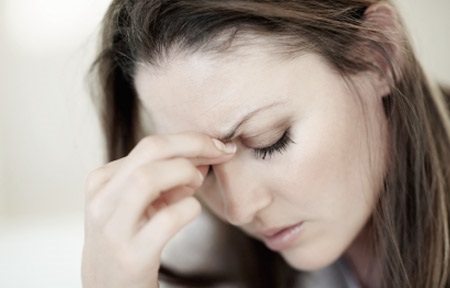
Hyperhidrosis can lead to stress, and stress can trigger these symptoms again - try to break the cycle and find a solution.
Symptoms of excessive sweating
There is no established way to measure excessive sweating in terms of "amount of sweat". However, if heavy sweating interferes with Everyday life and normal activities, it may be hyperhidrosis.
Hyperhidrosis can also cause shyness, try to participate in social activities such as playing sports. Hyperhidrosis is always noticeable. 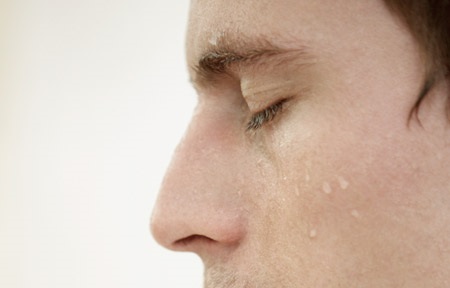
Consider a method that can help diagnose hyperhidrosis:
Primary hyperhidrosis most likely occurs when excessive sweating has been present for more than six months. It occurs predominantly in the armpits, palms, soles, or craniofacial areas. This process is quite symmetrical, does not happen at night and in most cases occurs at least once a week. Hyperhidrosis is genetically determined and manifests itself before the age of 25 years.
In the case of primary or local hyperhidrosis (when only certain parts of the body are affected), the risk areas are:
- armpits (axillary hyperhidrosis)
- back
- palms (hyperhidrosis of the palms)
- face (facial hyperhidrosis)
- soles of the feet
- breast
- back of knees
These areas have an unusually high concentration of exocrine glands, which are responsible for sweating. Flashes of localized sweating, however, can occur simultaneously on several parts of the body.
Frequency of hyperhidrosis
One or more episodes of excessive sweating per week is normal for most of those who suffer from primary or localized hyperhidrosis (but not during sleep).
For those who suffer from secondary hyperhidrosis (when the condition has a definite cause), the frequency of sweating depends on the development of the disease that caused it.
Managing symptoms of excessive sweating
Dealing with flare-ups of excessive sweating can impair the quality of daily life:
Frequent showering or changing clothes in one day is time consuming, reluctance to take off a jacket or feeling uncomfortable when shaking hands, for example, can lead to awkwardness in public, the desire to attend sporting events disappears. This may even affect professional activity(for example, holding tools or using a keyboard can become problematic in cases of localized hyperhidrosis on the hands). The result can be social self-isolation of people who suffer from hyperhidrosis.
Causes of hyperhidrosis
Overactive sweat glands (so-called eccrine glands) are obviously the main cause of hyperhidrosis.
Research has shown that in cases of primary or localized hyperhidrosis, the part of the brain that regulates sweating generates signals for the eccrine glands even when there is no particular need to cool the body. This dysfunction of the autonomic nervous system can lead to sweating, which occurs for no apparent reason, and gives the person trouble.
Primary or local hyperhidrosis considered genetic: there is a tendency to heredity (a family history is present in 30 to 50% of people). Often, relatives currently or previously suffered from local hyperhidrosis. It occurs in otherwise healthy people during puberty and usually peaks in the second or third decade of life.
Causes of secondary hyperhidrosis others.
Among them may be:
- Pregnancy
- Menopause
- Anxiety
- Substance and alcohol abuse
- Cardiovascular diseases
- Diabetes
- Respiratory failure
- Obesity
- Gout
- An overactive thyroid gland (hyperthyroidism)
- The use of certain drugs
- Peripheral nerve injury
- Parkinson's disease
Alcohol can trigger an outbreak of excessive sweating.
The main cause of hyperhidrosis is a genetic predisposition.
It is very important that any case of secondary hyperhidrosis be examined by a physician to properly diagnose its causes.
Temporary or long term?
Even if the causes of hyperhidrosis are genetic, there are factors that can lead to an outbreak of sweating. Just as in the case of an attack of temporary excessive sweating, they can be caused by anxiety or experience in a particular situation, meeting or event.
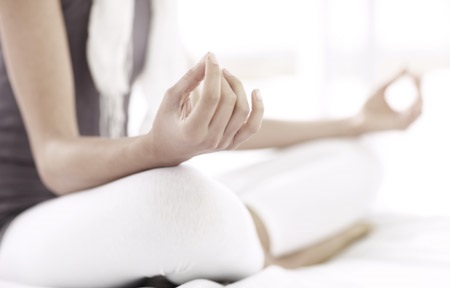
Try to plan your daily routine and avoid stress.
Changes in lifestyle, changes in general health or body weight, alcohol, medications, or drug use can also cause flare-ups of excessive sweating, as can changes in climate or temperature.
If hyperhidrosis is caused by infection, disease, or hormonal changes, it is secondary hyperhidrosis, and the cause itself is a factor in its occurrence. In such cases, it is necessary to consult a doctor.
Small lifestyle changes can help if the sweating is temporary.
What measures to take?
There is no remedy that stops any form of sweating. After all, this is an important function of the body. However, people who suffer from hyperhidrosis can choose one of the ways to get rid of the disturbing symptoms of hyperhidrosis. Some of them - even for a long time.
A wide range of surgical and non-surgical methods are available, which differ in cost, side effects and duration of action. Most of them act on the nerves, stimulate the sweat glands.
Effective treatment can lead to significant improvements in the lives of patients, provided that diagnosis and treatment are carried out prudently.
Treatment for hyperhidrosis can vary and should be discussed with your doctor.
Local application: antitranspirant
Antitranspirants contain aluminum salts that act by partially and reversibly blocking the ducts of the sweat glands. 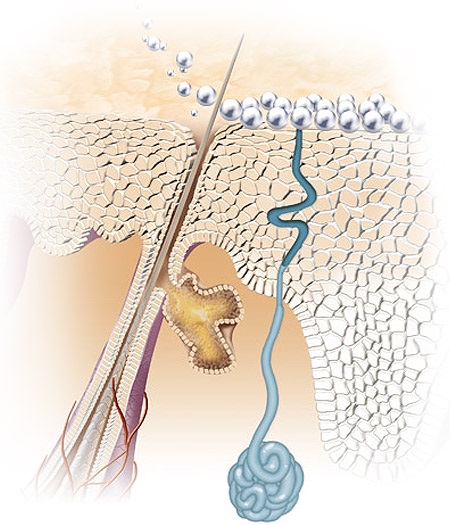
Antitranspirants(also called antiperspirants) are especially effective in reducing excessive sweating in the armpits due to the action of their main ingredient (based on aluminum salts) and are usually the first remedy recommended by dermatologists, as it is more of a "cosmetic" and non-invasive way to keep sweating normal.
As active substances, antitranspirants contain aluminum salts, such as aluminum chlorohydrate (ACH) or aluminum chloride (ACH). They act on the eccrine and apocrine sweat glands, partially and reversibly clogging the ducts of the sweat glands, thus reducing the amount of sweat they secrete. This blockage is harmless. Since less sweat is produced, there is less hydration and noticeably less odor. Antitranspirants are available as sprays or roll-on deodorants and even in small amounts can significantly reduce sweating.
Use roll-on antiperspirant deodorant at night before bed and in the morning. Using a roll-on deodorant-antiperspirant in the evening allows the active ingredients to create a plug in the sweat glands. They don't wash off in the shower and will last at least two days. Therefore, the effect of the product increases with increasing frequency of use.
Please make sure you read the instructions completely and follow the directions for use carefully, and do not use it daily for longer than allowed to avoid irritation.
Dermatological treatment options include:
- Botulinum toxin type A
(Commonly known under the brand name Botox) Particularly useful for those who suffer from underarm sweating, it is considered one of the best treatments tested to date, injected with a neurotoxic agent and helps prevent excessive underarm sweating: the nerve pathways that stimulate the sweat glands. glands are blocked, and sweating stops. - Iontophoresis (Electrical Treatment)
With this method, the skin is saturated with ions by electric current. Ions act on the sweat glands, temporarily "switching" them. Iontophoresis is suitable for the treatment of local hyperhidrosis on the hands and feet. In severe cases, even surgical procedures on the thyroid gland can be applied. Procedures (mostly performed with a laser or surgery) aimed at eliminating the neural pathway that stimulates sweating. Recommended for patients who suffer from severe localized hyperhidrosis on the arms, armpits or face. - Medications with so-called anticholinergics
In this systemic treatment, neurotransmitter blocks help prevent stimulation of the sweat glands. However, these drugs are predominantly used to treat secondary hyperhidrosis and have serious side effects.
Other ways and measures that can help
Symptoms of excessive sweating can be reduced through lifestyle changes such as:
- avoid spicy food, alcohol and coffee
- avoid sun exposure
- wear clothes made from natural fibers such as cotton
- choose light or very dark clothes that will hide the signs of sweating
- Underarm pads are also a good option. They will absorb sweat and protect clothing.
Sweating is a natural physiological process responsible for the normalization of body temperature, the removal of toxins accumulating in the body and the activation of metabolism. In addition, sweat can act as a reaction to various stressful situations. The normal functioning of the sweat glands does not cause discomfort to a person, however, excessive sweating, accompanied by an unpleasant odor and wet clothes, is a serious problem.
Hyperfunction of the sweat glands, also known as hyperhidrosis, can be triggered by a malfunction of various body systems or be a serious pathology.
There are 2 types of hyperhidrosis:
- Local. Sweating is limited. It can be observed on the face, head, feet, palms and armpits;
- Generalized. There is simultaneous and profuse perspiration all over the body. As a rule, it is observed during infectious diseases, febrile or stressful conditions. In any case, such work of the sweat glands should be the reason for an urgent visit to a specialist.
In addition, hyperhidrosis can be primary and secondary:
- Primary hyperhidrosis most often occurs during puberty or during youth when there is a restructuring of the body and a change in hormonal levels;
- Secondary hyperhidrosis can be a symptom of a number of diseases of a neurological, endocrine or somatic nature.
Special attention deserves excessive sweating at night, provided comfortable temperature in the bedroom and the optimal density of the blanket. During sleep, the human body is at rest, but if after waking up the skin on the chest, back or head is wet, such a reaction of the body may indicate the presence of serious diseases, such as:
- Pneumonia, influenza or SARS;
- Leukemia, lymphoma or malignant tumors;
- Problems in the work of the cardiovascular system;
- Vegetative-vascular dystonia;
- Hormonal disbalance;
- Hepatitis;
- Fungal infections;
- AIDS.
If the problem of profuse sweat is persistent, it is recommended to seek qualified help.
Causes of increased sweating
 Constant stress and overexertion can lead to the development of hyperhidrosis.
Constant stress and overexertion can lead to the development of hyperhidrosis.
Often, excessive sweat is a physiological feature of a particular organism, so it does not carry any danger, but can only cause psychological discomfort. However, if there is a sharp change in the work of the sweat glands, it is necessary to find the source of the problem.
Sweating more than normal can result from:
- Overexcitation of the central nervous system. Excessive sweat often accompanies a person in a stressful situation or in case of emotional instability (anxiety, panic, depression, depression). In such a situation, the treatment is aimed directly at stabilizing the patient's mental state and emotional background, as a result of which the problem of sweating disappears;
- Increase in body temperature. It happens natural and pathological (in the presence of various inflammatory processes). Antipyretics will help to cope with sweating;
- Hyperthyroidism. In the presence of violations in the work of the endocrine system, an experienced endocrinologist will help to cope with unwanted sweating;
- Diseases of the pancreas. Profuse sweating is a common symptom in diabetes;
- Hormonal disruptions. The active work of the sweat glands is observed during the years of puberty in young people, regardless of age. Women often experience profuse sweating during pregnancy and menopause, while men may experience a similar problem with prostatitis;
- Cardiovascular diseases;
- Vegetovascular dystonia. In this state of the body, there is a failure in the interaction of the sympathetic and parasympathetic systems, which can provoke excessive sweating;
- Overweight or disorders of fat metabolism. Shortness of breath, sweat and bad breath often haunt obese people. Due to excess body weight, the body is forced to spend more strength and energy, and as a result, the work of the sweat glands is enhanced. In this case, it is recommended to review the diet and include sports in your daily routine, which will help to cope with excess weight and unwanted sweat;
- Taking medications. Among the adverse reactions of a number of drugs is increased sweating. If a similar problem arose during drug treatment, you should consult a doctor who can choose the right substitute for the drug;
- Diseases of the kidneys. Such diseases negatively affect the water-salt metabolism, which in turn negatively affects the excretory functions of the body (in particular, hyperhidrosis develops in the armpits and feet).
Excess sweating can be the result of gastronomic addictions, such as a love of spicy food, hot dishes and drinks, spices, alcohol. Eliminating the problem in this case is as easy and simple as possible: it is enough to refuse such dishes, or reduce their consumption to a minimum.
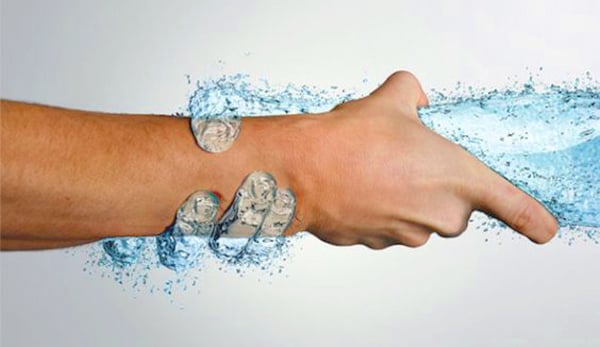
There are several treatment options for unwanted sweating, each based on the general condition of the patient and the degree of hyperhidrosis.
Minimal traumatic methods include:
- Iontophoresis (also known as neuromuscular anesthesia). The procedure is most convenient, painless and safe. It is aimed at damaging the channels of the sweat glands. It is used when excessive sweating affects the limbs. During the procedure, the patient's hands or feet are in water through which current is passed. The course of treatment is an average of 10 sessions lasting no more than 15 minutes. The effect of such treatment persists for several months;
- Botox shot. The injections are aimed at blocking the nerves responsible for supplying fluid to the sweat glands. The procedure can be performed on the face, limbs and armpits. Injections of the drug are prescribed in the presence of severe forms of hyperhidrosis in patients who, due to various circumstances, cannot decide on surgical intervention. Positive results are noticeable already in the first 7 days of therapy. Botox injections should be repeated every six months to a year, depending on the degree of progress of hyperhidrosis. The effect of this method of treatment is observed in 90% of cases, however, it is important to remember that up to 5% of the population demonstrate resistance to the effects of Botox, therefore, this way of dealing with the problem will be inappropriate.
Radical methods for solving the problem of excessive sweating include:
- Endoscopic sympathectomy. This method of treatment is prescribed if hyperhidrosis affects the hands and armpits. The procedure is performed under general anesthesia, as its task is to remove the corresponding nerves in the armpits. After surgery, the patient is under the supervision of doctors for 1 day. Despite the fact that the sutures are removed a week after the operation, the working capacity of the limb is restored in a few days, which allows a person to return to his usual way of life in short time. The method of treatment is effective in 95% of cases, relapses are observed in rare cases, however, the intensity of hyperhidrosis is weak;
- Laparoscopic lumbar sympathectomy. It is prescribed for excessive sweating of the legs. The effectiveness of the method is observed in 80% of cases. The chance of recurrence is minimal, the recovery of the body occurs the next day after the operation. However, this procedure is not very popular due to possible scarring.
With a mild form of hyperhidrosis, drug treatment can be prescribed: preparations based on belladonna or belladonna alkaloids. For local use, Formagel or Formidron may be prescribed.
Prevention of sweating
To cope with the negative manifestation of excessive sweating will help the rejection bad habits(smoking or drinking), hardening, outdoor walks and moderate sunbathing. In addition, you should not neglect the rules of personal hygiene - taking a shower in the morning and evening hours has never harmed anyone.
Also, to combat unpleasant body odor, the following measures are good:
- Use of antiperspirants. Such drugs are aimed at reducing the activity of the sweat glands. Different kinds deodorants differ in the strength of their action, but regardless of this, aluminum chloride is present in their composition, which temporarily blocks the sweating channels. It is not recommended to use such funds on an ongoing basis for people with normal sweating, as there is a risk of harming your body. For people for whom excessive sweating is an acute problem, an antiperspirant will become an indispensable tool;
- Buying breathable underwear. It is recommended to opt for clothing made from natural materials and seamless fabrics. It is noteworthy that hosiery products with silver ions are presented on the modern market, which have an antibacterial and anti-inflammatory effect, thereby eliminating an unpleasant odor;
- Dieting. Hot foods, hot spices, coffee and alcohol cause sweating, so it would be wise to eliminate them from your diet;
- Taking herbal baths. Baths with the addition of dry mint, chamomile flowers, oak bark or sage are a proven tool in the fight against unwanted body sweating. To enhance the result after the procedure, it is desirable to take a contrast shower.
In addition, there are various pharmaceutical powders and ointments that do an excellent job of neutralizing body odor, as well as unconventional preventive measures like acupuncture and massages. In any case, if excessive sweating occurs, it is necessary to undergo a medical examination in order to know the exact cause of the problem and its appropriate solution.
(no votes, be the first)
